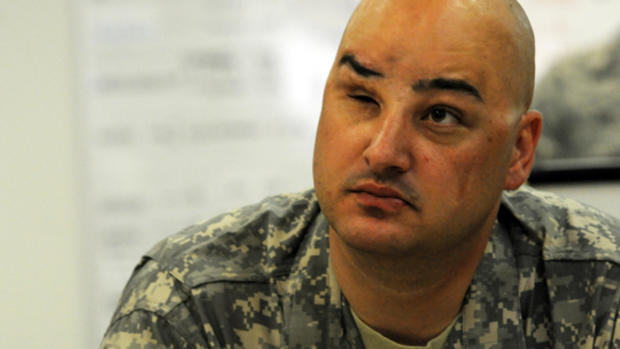Haunted by battle, wounded vets return to Iraq
NEW YORK - The war in Iraq is over for the United States, but not for the Americans who fought there. CBS Evening News anchor Scott Pelley reports on a remarkable therapy that takes some of the more than 32,000 troops wounded in Iraq back there to confront the events that changed their lives.
For a "60 Minutes" report, Pelley went along with eight returning soldiers and Marines on a mission called Operation Proper Exit.
For most of them it had been a long time since they'd flown on a military transport or worn the uniform. They'd been wounded years ago - several were civilians now. But for one week, in Operation Proper Exit, they were proper soldiers and Marines again.
Learn more about Operation Proper Exit
Of the eight, returning may have been toughest for Steven Cornford. He left Iraq and was awarded the Silver Star for valor. But they don't give away Silver Stars for nothing. Sitting down with Cornford, you can learn what post-traumatic stress disorder is all about.
"When you were coming over here, for Operation Proper Exit," Pelley asked, "Did you wonder whether you were doing the right thing?"
"Sometimes," Cornford replied. "My wife brought up a good point when I told her I wanted to do it. It's, like, 'What if it makes it worse? What if it brings it all back?' Because for a while I would sleepwalk, and scream in my sleep, and stuff, and I haven't been doin' that a lot lately, but when I found out I was coming back, for about a week before, I started doin' it again, and it really scared her."
Cornford's nightmares are rooted in Easter Sunday 2007, when he was just 18 years old. His platoon assaulted an enemy machine gun nest. He was hit in the left shoulder. His lieutenant, Phillip Neel, sprinted forward to help, but was cut down.
Cornford returned fire and threw two hand grenades into the machine gun nest. Then, he carriet Lt. Neel a mile to a Medevac helicopter than took them both to a field hospital. Neel didn't make it, and Cornford cannot forgive himself.
Wounded warriors confront painful past
Cornford said he came back, "To try and let it go. It's something that haunts me every day."
"I see his face every time I close my eyes to go to sleep at night," Cornford said. "I blame myself a lot, because I got hit first, and he was coming to get me. I want to be able to lay it to rest, like he is. 'Cause I know he's in a better place. I just, I know he would want me to."


